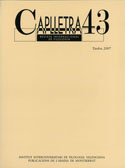L'emissor com a organitzador del discurs acadèmic
DOI:
https://doi.org/10.7203/caplletra.43.4807Palabras clave:
Contrastive Rhetoric, Academic Discourse, First Person Grammatical Marks, Discoursive Organization Resumen
Resumen
This article presents a contrastive analysis of the ways in which the first person markers as a discoursive organizer are manifested in academic texts. The corpus consists of academic texts published between 1989-2001 in reviews with a high level of specialization in three fields (Linguistics, Law and Physics) and in three languages
(Spanish, Catalan and English). On one hand, this discoursive function is characterized by taking the parameters of Cognitive Linguistics as a basis, specially concerning the theory of mental spaces, and subjectivity. On the other hand, quantitative analysis
shows, with graphics, the differences between these languages, in which Catalan may occupy an intermediate place between reader-oriented languages (English) and writer-oriented languages (Spanish); besides it also displays differences between the
aforemention scientific fields which represent the three branches of the knowledge, in which social sciences (i. e. Law) may be an intermediate stage. Regardless of the discipline and the language, the extension of the text has to be taken in consideration
because it may determine the role of the speaker as organizer and the results.
 Descargas
Descargas
Descargas
Publicado
Cómo citar
-
Resumen324
-
PDF (Català)117
Número
Sección
Licencia
El autor o autora que dirija un trabajo a la redacción de Caplletra para ser publicado tiene que ser la persona titular legítima de los derechos de explotación. La legitimación para la publicación del trabajo tiene que incluir también las imágenes, las tablas, los gráficos y otros materiales que puedan complementar el texto, con independencia de si es su autor o autora.
Copyright. Al publicar el trabajo en la revista, el autor o autora cede a Caplletra. Revista Internacional de Filologia los derechos de explotación (reproducción, distribución y comunicación pública), tanto para la edición impresa en papel como para la versión electrónica.
Todos los trabajos publicados en Caplletra se encuentran bajo una licencia Creative Commons del tipo Reconocimiento-NoComercial-SinObraDerivada 4.0.
RESPONSABILIDAD
Caplletra. Revista Internacional de Filologia no se identifica necesariamente con los puntos de vista sostenidos en los trabajos que publica.Caplletra. Revista Internacional de Filologia declina toda responsabilidad derivada de cualquier vulneración eventual de los derechos de propiedad intelectual que pudiera ser llevada a cabo por los autores o autoras.






